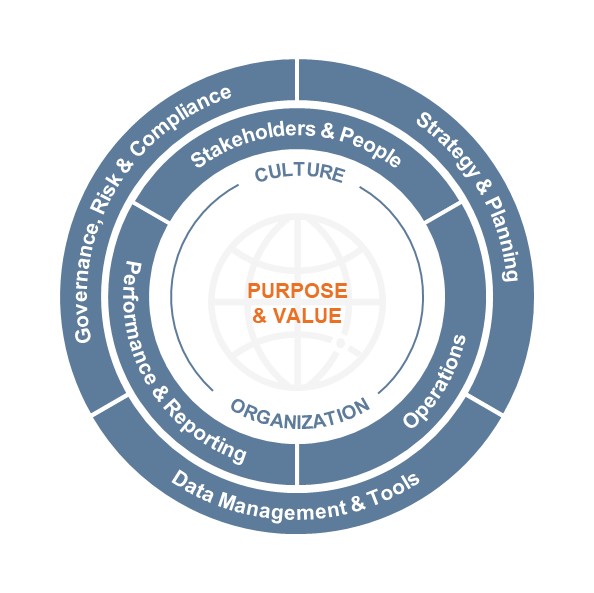What: As regulatory and stakeholder expectations around sustainability continue to evolve on a near daily basis, Protiviti has created an online guide of frequently asked questions to help business leaders navigate this dynamic complexity.
Why it matters: The FAQ Guide answers more than 80 commonly asked questions, from strategy and planning to data, governance and reporting.
Next steps: The FAQ Guide is a living document that we will continue to update as the landscape changes and new questions arise. Bookmark this page and use it as a reference on your sustainability journey.
___ ____ ___
Why Sustainability Matters
“Meeting the needs of the present without compromising the ability of future generations to meet their own needs.” In 1987, the United Nations’ Brundtland Commission published this definition of sustainability in its report, which called for a strategy that incorporated both economic development and consideration for the environment. Over the years, other definitions of sustainability have emerged, but the Brundtland definition remains a useful explanation that distills sustainability in a concise manner while also making clear the enormity and complexity of the undertaking.
A few short decades later we are facing a world that’s changing, and at a very rapid pace. The success of any organization is now highly dependent on the performance of other organizations, and on the continued viability of the markets and communities it serves.
Investors, stakeholders and regulators are watching closely how organizations handle environmental, social and governance (ESG) matters. The climate ruling by the U.S. Securities and Exchange Commission is the latest in a string of regulatory developments around the globe. Accurately reporting environmental impacts has been added to the list of responsibilities of CFOs and internal auditors. For boards, it’s another key area of strategy and oversight.
Questions Abound
Organizations need to adapt to these changes quickly. There is a lot to learn, even for those who may be ahead of their peers. Questions such as these are common: What does it mean to be sustainable in a business context? What do we need to demonstrate, and to whom? How do we make our reporting credible and compliant? How do we get actionable and accurate data both to make and prove progress?
To help organizations navigate this new complex environment, Protiviti has created a guide of frequently asked questions. From basic concepts and definitions to best data, governance and reporting practices, the guide serves as a useful resource for companies at any stage of their journey – from those still determining their stance on sustainability, to those who have been reporting for years but are looking to enhance, streamline and focus their existing sustainability practice and reporting.
An Easily Accessible Reference
Protiviti’s FAQ Guide is a free online resource consisting of more than 80 questions and answers. It is organized in six topic areas mirroring Protiviti’s ESG framework, which we have used for years to help clients (and ourselves) stand up a sustainability governance and reporting structure. You will find that navigation around the FAQ Guide is easy and that sequential reading is not required – you can go directly to the section or question top-most on your mind.
Protiviti’s ESG framework
Our objective with this FAQ guide is to provide the reader with helpful insights, knowing that it cannot be an “end all, be all” publication due to the dynamic nature of the subject. We expect to add and update this information as the landscape shifts. What we do know is that sustainability is here to stay and that, at least for a while, the questions may outnumber the answers.
Take Action
The FAQ Guide is not a one-time read. We suggest you bookmark this page and use it as needed to answer questions along your sustainability journey. Our hope with this FAQ Guide is that it encourages dialogue and engagement inside your organization to help address the risks and take advantage of the opportunities that sustainability presents to all of us.







